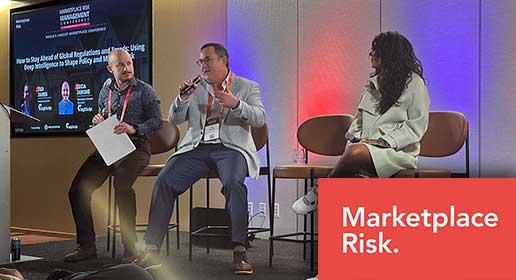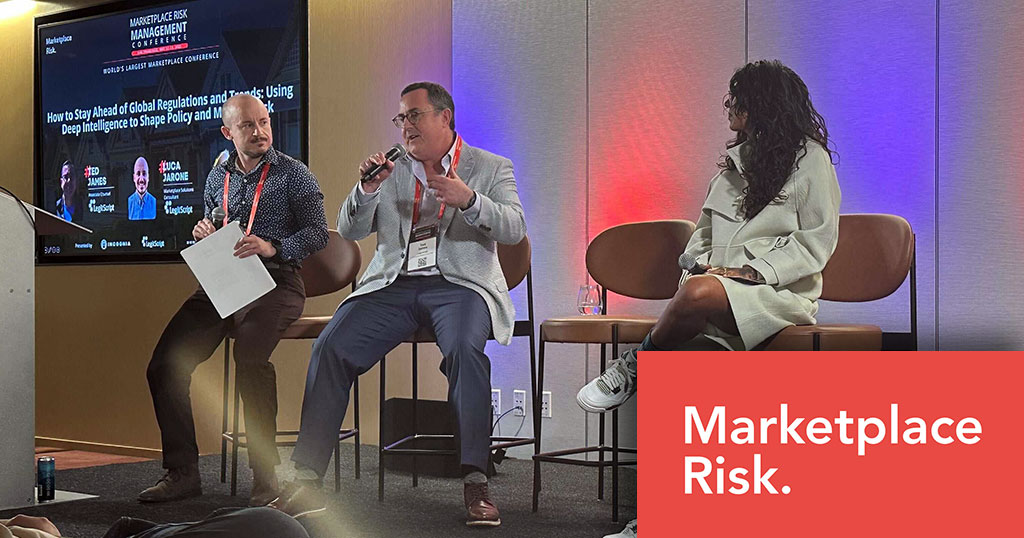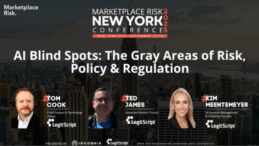Marketplaces and other online platforms must constantly revisit and stress test their policies to ensure they are properly mitigating risk while providing sufficient room for growth. But what happens when a new regulation or trend upends those policies?
Listen below to an excerpt of the panel discussion held this year by the LegitScript team at the Marketplace Risk Management Conference in San Francisco: The Dark Side of Weight-Loss Drugs: Regulation, Risk, and Red Flags.
Transcript
Luca: I am Luca Jarone, with the Legit script team. We're proud to be a top sponsor of Marketplace Risk and really excited to have you all here today. We've all eaten some lunch, hopefully gotten some coffee and are feeling somewhat awake, hanging in there with us. We're talking about, oh, yeah, perfect. Walking in with coffee, that was not choreographed, but I appreciate you so much that timing was perfect.
We're going to talk about drugs. We're going to talk about GLP-1s and weight loss medication and the ways that folks are selling it illegally or selling counterfeit versions online. I think everyone in this room has probably heard of Ozemic and Wegovy and all of those that have exploded in popularity over the last couple of years. So excited to get into it. With me today, I have Ted James, who's on our regulatory research team. Ted, you want to introduce yourself?
Ted: Yeah, hi, I’m Ted James, I work at LegitScript. I'm an attorney on the research team. I basically spend all day tracking developments in enforcement patterns, products, and regulations across the globe.
Luca: Yeah, awesome. So the focus today is we're looking at how these products show up online. We're going to dive into what they are a little bit around how they're regulated. Some of the changes that have happened over the last even few months, this is a constantly shifting area due to some of the shortages that were happening in the compounding pharmacies that were able to produce these products for a while, that's shifting now that the shortage is over.
And we'll show you some of the places where we're seeing this seeing this happen online and some of the dangerous ways that these products are being sold, while keeping in mind the harm to actual people who are pr purchasing these products and using them in ways that either, you know, with results that might not be anticipated, you can have some pretty adverse reactions when you buy something online that you think is a legitimate legitimate drug and isn't. So we'll get into all of that. We already introduced ourselves, so we can dive right in. and patience with me while I navigate this. But kicking things off, just talking about what GLP ones are, right? And Ted could rattle off the full API, the full name faster than I could, but we've heard of products like Ozempic and Wegovy, right? They were originally produced to treat diabetes. Then, there was an effect that was found where it caused users to lose weight, and so they've exploded in popularity. We've talked a little bit about the shortage for a couple of years in manufacturing that allowed compounding pharmacies to make these products themselves. Ted, do you want to speak to that a little bit to the shortage?
Ted:
Yeah. Oh, yeah, compounding pharmacy. So there's nothing inherently wrong with compounding pharmacies. I mean, traditionally, that's the way we all got our medicines. Historically, your doctor would write you a prescription, you take it down to the pharmacist, the pharmacist would grind up the medicine and make you your own personal medicine in a jar. So there's nothing inherently wrong with compounding pharmacies. The way compounding pharmacies generally work is when there's a drug that you need or a certain specific patient needs it in a specific form for whatever reason, because of their health, because of the way their body works, because of the way the drug is structured.
A compounding pharmacy will make it up for them on an individual basis. It's the way we get like chemotherapy drugs. So historically, I mean there's nothing wrong with compounding pharmacies. Compounding pharmacies generally cannot make a copy of a drug that's under patent. They cannot make a specific exact copy. The only time that can be is when a drug has been declared in shortage by the FDA. And these GLP-1 receptor agonists were declared, semaglutide specifically, in injection form, were declared in shortage, a couple of years back. So that meant the compounding pharmacies could start making those exact copies of those drugs.
And I don't think we can I don't think it's possible to overstate what a big impact that was on the compounding pharmacies. Generally, when drugs go into shortage, it's because of production, you know, it's not necessarily because of such high demand. It's because there's not enough money in it to make the drugs. For example, take Adderall. Adderall, I went to law school so shut out for Adderall. But I mean, Adderall's incredibly inexpensive. It's a dollar a pill, and there's really not a lot of money in it for the manufacturers to crank out a lot of Adderall. So while demand for Adderall is high, the real reason there's a shortage is because they's just not a lot of money to make it.
EpiPens. EpiPens have been in shortage for a long time. The reason EpiPens are in shortages because they're expensive, right? Epipens, $1,000 or whatever they are, $700. But people don't use a lot of Epipens. You should not be using an EpiPen once a month. The difference is, so here with these new products, they came out, and not only were people using them weekly, but they're very, very expensive, and you're just talking about spending thousands of dollars a month on these products. So this is a whole new world for these compounding pharmacies, and it just opened their eyes to what they could do.
You saw a lot of new compounding pharmacies coming on the scene, and it's been massive for them. I think we hit all the points there, basically. Yeah. That's all I had to say about that.
Luca: And we should say, too, that, you know, as this demand has exploded and as pharmacies have been compounding, there are a lot of the time following the rules, right? We've seen a surge over the last couple of years in applications to our pharmacy certification program from these pharmacies who are trying to do the right thing and trying to, you know, establish their business. So it's it's not that they're necessarily doing the wrong thing, but what happens is these products get sold by folks who aren't requiring a prescription or who are selling these products in ways that the users actually have to, you know, rather than rather than being sold in the form of a pen, right, they're sold in the freeze- dried form and have to be reconstituted.
Ted: Yeah, I mean, like, you know, so there's a couple, like I said, there's nothing inherently wrong with a compounding pharmacy in concept.
A couple of issues did come up. One is, you know, if you know, Eli Lilly and Nova Nordus can't get enough of these supplies, where are the compounding pharmacies getting these supplies? And you, the answer to that in some cases where they were getting them from factories overseas, that were not necessarily making exact copies of the molecules, but they were making them with like semaglutide salts or other analogues of semaglutide, which the FDA is specifically warned against.
Or they were getting them from factories that had not been inspected. I saw some statistics the other day that 40% or 22% of the factories making the bulk product overseas had never been inspected by the FDA, and 40% had been inspected and failed their inspections. So that's one issue you have is where they're getting the bulk material.
The other issue is, is when last year in 2024, the poison Control Center Poisonrol Center's nationwide saw a massive jump in in calls, which you would expect because we're selling a lot more of these products, but 75% of the calls involved accidental overdoses of the substances, which tells you, since, you, usually Ozempic and Monjorno and whatnot you're usually by the branded version with the auto injector, these are people that are buying the bulk product in vials and injecting themselves. And so either they're not getting instructions from their doctor, they're not getting instructions from their pharmacist, or there's some other issue there. So those are two issues that have come up with compounding pharmacies and the GOP ones.
Luca: Yeah, 100%. I mean, relying on people to reconstitute their own drugs without the support of a pharmacist. There we go. Yeah, so some of the concerns that we already talked about with compounding pharmacies that aren't doing things legitimately, right? So the quality of those ingredients hasn't been properly assessed, where they're sourcing, again, dosing concerns. So being able to figure out the right dosage as somebody who just bought the, you know, bought the vial of semaglutide online online and is having to, you know, act like a chemist and, you know, add bacteriostatic water reconstitute for injection. It's not safe, right, without proper guidance. And there have been some serious problems with people, you know, injecting themselves and then either dying or having severely reverse or severely adverse reactions to it. Ted, you want to speak a little bit to some of the ways that they're promoted for, you, research use only is one that we tend to see a lot, right?
Ted: Yeah, so like, when we go out, we start looking and doing our monitoring and checking just to see who's, you know, who we consider problematic sellers or who we are concerned about or when we start reporting, advertisers. You know, there's some behaviors that we look at that we consider big red flags and necessitate more investigation.
One of them is the “for research use only.” You see a lot of times vendors will be selling products without requiring a prescription. stating that these are not for human use, or for research use only. We see it a lot in bodybuilding products as well, like steroids. We also see it in a lot of psychedelic products if you're doing research on how high a person can possibly get. But so, but like I said, I think in our earlier presentation, that fools no one.
The FDA is actually published specific rules about, how you assess that sort of a situation and said that using for research use only, you're saying it's not for human use or it's not a drug or whatever sort of disclaimer you want to get put on there, does not mitigate in any way the fact that it is a drug and how it's regulated. And in fact, there's numerous court cases where people have been convicted of selling products without a prescription, where their penalties were actually increased, because the DOJ successfully argued that saying something's for research use only shows that an intention to deceive an intention, and just bad acting.
Luca: Yeah, 100%. If you're looking at a listing or a post on your platform and it says it's for a peptide that's for research use only and people are commenting, saying things like, my lab rat got super swoll. It's not legitimate.
Ted: Yeah, I mean, I, I mean, there's a lot more nuance to the regulation about that. But like you said, you look at all the evidence on the website, you look at all the things. And these sellers are, they want to communicate what they're selling and what it's used for. So there will be human youth evidence, basically, on the website somewhere, in almost all cases.
Luca: 100%. And, you know, spoke to this a little bit, but, there's a real harm, there's a real impact on people that are purchasing these products online without knowing exactly what they're getting into. I remember there was an article that came out in the BBC. There was a woman in the UK who last fall, this news came out. She had bought what she thought was legitimate Ozemic, actually, online, injected it, and it wasn't real Ozempic, and she went into essentially a diabetic coma, and almost lost her life. So this is really serious stuff. We can talk about the very silly ways that sellers try to evade detection on different platforms.
But really at the end of the day, what they're actually selling has an impact on people who, you know, this is not. This is not something that, you know, we're shaming the people who are going out and buying these products, right? If you think it's legitimate or it's something that you want, you, to have the risk of maybe losing your life purchasing it, it's really scary. So that’s why we’re focused on this topic.
Ted: And also, you know, like I was mentioning, like, the massive impact this has had on the compounding industry and the medical industry in general, because there's so much in this. And now the shortage is over, and a compounding pharmacy for both semaglutide intrippetite. The shortage is over, I think treppetite, they might have for bulk compounders, which there's two different types of compounding pharmacies. For bulk compounders, I do think they have another two weeks where they can keep manufacturing these products.
But the shortage is over. So compounders from now going up forward, they can't make exact copies. The smaller compounders, the 503A compounders, they can make different versions of the drug, and what they're going to do is, let's say, you, but they can make different versions of the drug for a medical need for a specific patient. So you can say, well, geez, I can't write you a prescription for semaglutide injections anymore, but I can make it chewable for you. Because I, you know, your prescription is gonna say, you can't take shots. Or, you know, some of them are mixing other chemicals in with it, too, which brings a whole nother load of risks in, like, B12. You're seeing B12 mixed in with some of these products, and the sellers are claiming it helps your body, whatever B12 does for your body. in conjunction with the semaglutide.
But going forward, they cannot make copies of the drug anymore. And the problem is, there's so much money in this industry that they've been selling so much of this, you really can't scale the exemption that you can make individual problems privatized or individual specific products. It's just really tough to scale that because you have to have an individual prescription for each person that states the medicinal needs to haveasn exemption that specific product and to get that exemption. So it's really tough. So you can't put the genie back in a bottle. So the question really is, you know, what are these compounding pharmacies going to do going for it? And what are these big suppliers overseas going to do, after they've enjoyed the past year of making money? So that's why we're so concerned about bad actors and selling them for research purposes only. It's really tough to put that genie back into the bottle.
Luca: Yeah, absolutely. So we've talked about the legitimate path for selling these products and what's going on there. We've talked about the illegitimate path for selling these products. What's been really interesting to watch is because these are such hot products, because they're so popular and they've exploded over the last couple of years, we, of course, are seeing influencers take this up and pedal these products online through affiliate marketing schemes.
Which this is how LegitScript got our start back in 2007, it was really around these illicit networks of folks selling products like pharmaceuticals, like unapproved drugs, making money off of it, and getting people to sign up and resell for them. The way that that happens now is different than back in 2007, because we just have more internet for lack of a better way of describing it. There are just more ways to do that and faster.
So people build these big followings online and start to sell these products. So this is our friend Elena. We've been following Elena for a while. She started her, quote unquote, "business, suppose it is a business, not legitimate, spoiler alert, but she started in the sort of health and wellness space and promoted herself as, you know, a health influencer who was just trying to connect people with resources, right?
That turned into selling products like GLP1s, online in much the way we described, right? If you look closely at some of the ways that she's describing these products on her website, saying research purposes only, right, selling these products in little buy vials, you reconstitute it at home. But again, research purposes only. We're doing the right thing. We're above board. That's how she's talking about these products on her website. You notice her name, despite calling her company AC Peptides for her initials, right? She's promoting these products online through her social media channels as exactly what they are, right, as GLP1 peptides.
She's saying, okay, peptide, fam. go to my website, this is what you're buying. When you buy this product that I'm now using coded language for, looks like something for research, this is what you're actually getting. She promotes, quote unquote, educational content to teach people how to reconstitute peptides, right? These are unapproved versions of these products, they're prescription only drugs. There is a legitimate way to purchase them. This is not it. So again, this goes back to the kind of DIY, this is how to do it, this is how to reconstitute the peptides.
This is just a little snapshot into the network that she's built, right? So this one influencer, she started all of this by selling for a brand called Triggerger Brand Peptides. She was promoting their products through her social channels. She gets commission off of that, right? She was so successful in doing that she decided to spin up her own company and now she has affiliates under her that are selling these products and making commission under her own brand.
So things have evolved a lot with how these affiliate networks are selling online. It's happening a lot faster. We run into, I mean, there was a bodybuilding influencer that I remember that we reported to a partner who had a, you know 100,000 followers and he was promoting different brands of peptides and even anabolic steroid companies that he was getting commissioned from before his profile was taken down. So the visibility and the scale is pretty massive with something so popular, like GLP-1s. Ted, comments, thoughts?
Ted: No, I mean, just to reiterate again, it's like, it is astounding how much money, you know, when something is selling for $1,000 a month, you know, we've tracked several of these networks, and it is amazing. You know, you see mom and pops shops opening up in their garage and making $300,000 their very first month, and it is amazing how much money is in this, and it's just it's truly astounding.
And you know, the only, you other thing, you, I would add is, you know, the FDA, as a shortage is coming to an end has come to an end, we're not necessarily sure how aggressive the FDA is going to be in investigating all these individuals and all these compounding pharmacies and the people selling these things.
You know, doctors write prescriptions for the products. Most doctors are regulated by their state medical Board. It's very, very rare for the FDA to come in and actually start checking prescriptions specifically. I mean, it took forever in the painkiller space just recently for them to come in and actually start checking prescriptions and going through the records. took them finding doctors who were writing like 20,000 prescriptions a day before they actually came in and started checking prescriptions. So we're not sure how aggressive the FDA is going to be cracking down. Interestingly enough, though, both Lily and Novo Nortis have gotten very aggressive in filing lawsuits. So you might see one of those situations where it's the private right of action that actually ends up enforcing a lot of this stuff, because there's been numerous lawsuits filed against compounding pharmacies.
And the FDA has been sending warning letters, but it's one of those things where there's just so many people involved in this industry that it's going to be interesting to watch enforcement trends and how they go down. And I mean, quite frankly, I would think a lawsuit from Lily would scare me a hell of a lot more than a weak warning letter from the FDA that you can throw in the garbage can, and maybe they'll come back six months later and ask you again. So, and maybe that's the way of the future. I don't know. But there's something to keep in mind.
Luca: Yeah, absolutely. We talk a lot about the regulations and the impact of enforcements, but at the end of the day, do you want this type of content on your platform at the, you know, the risk of users, at the risk of people that are coming to your marketplace or your social media site and and want to access content that is safe, right? So that's the impetus behind this in a lot of ways is really thinking about what potential harm is there for users, and how can you make things a bit safer for them.





